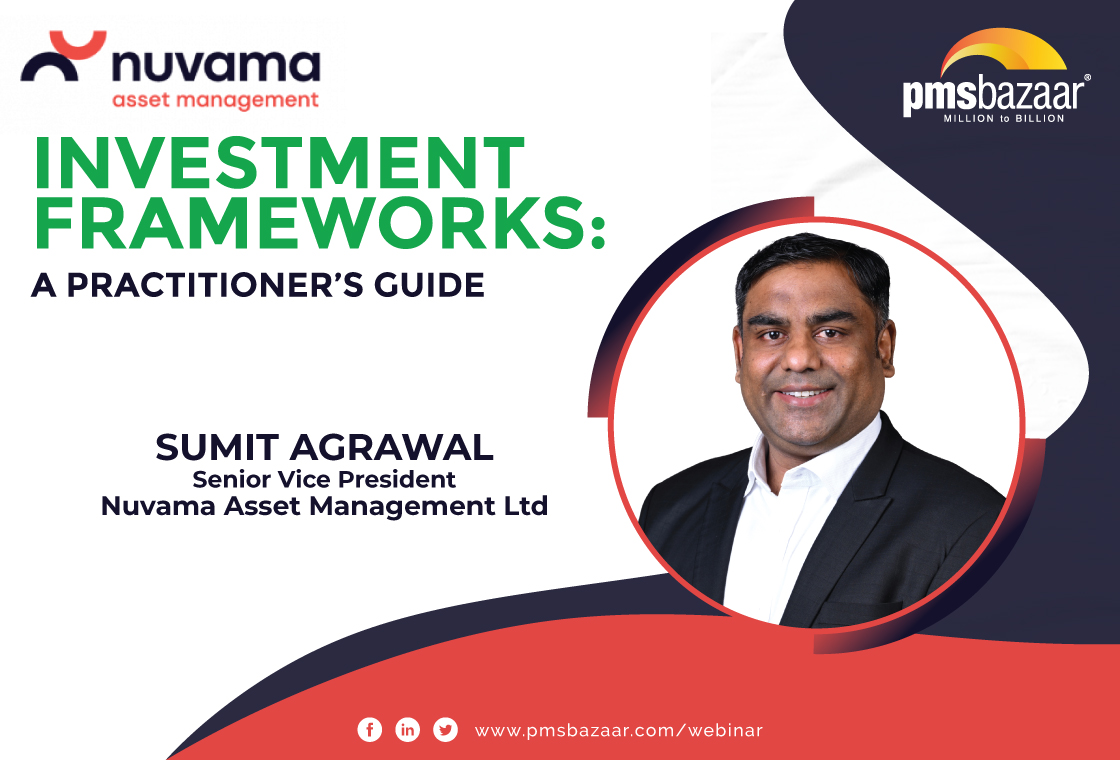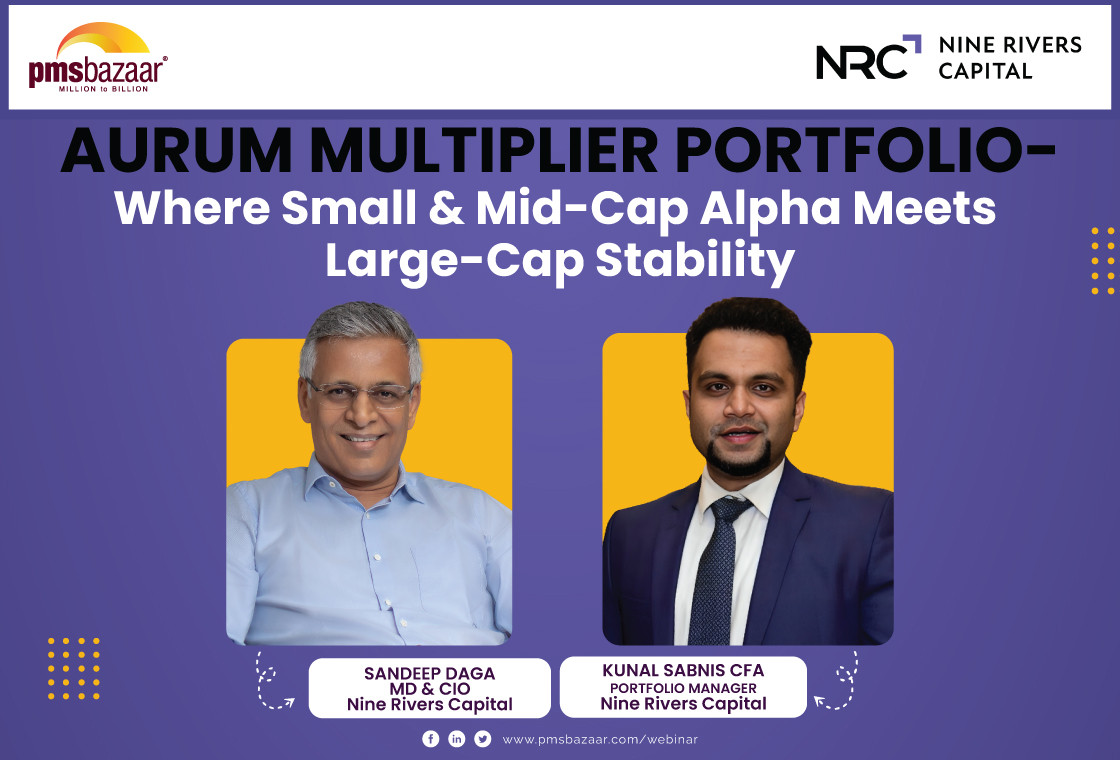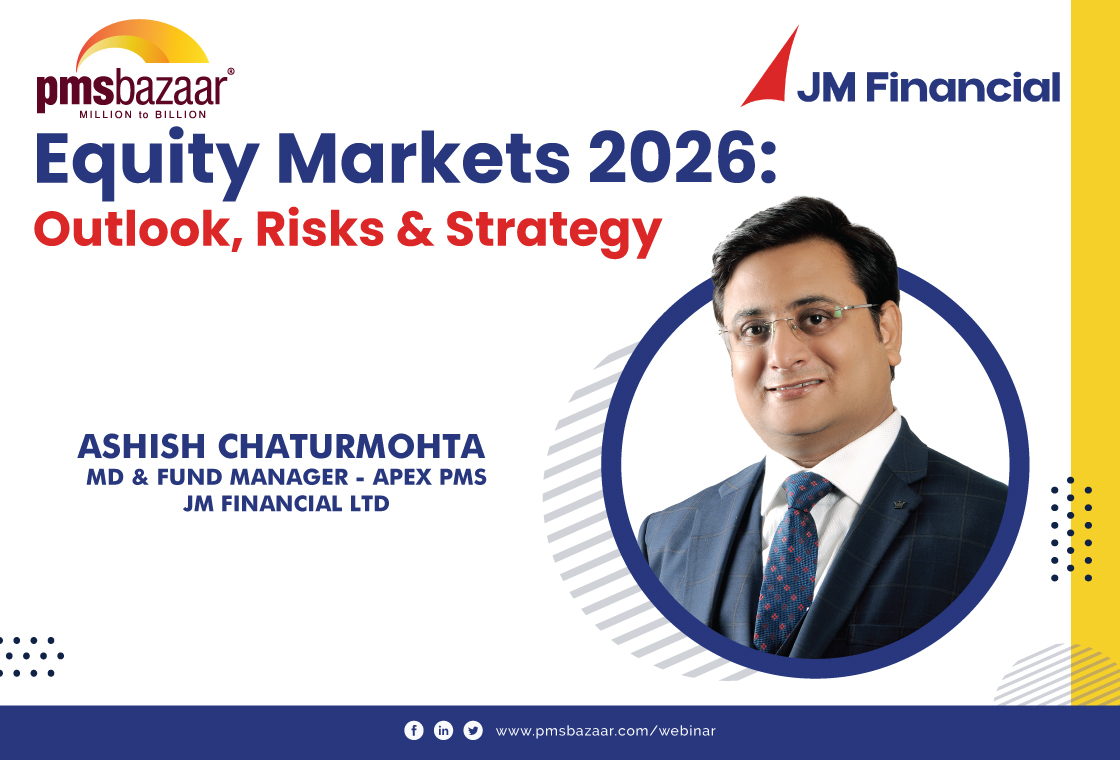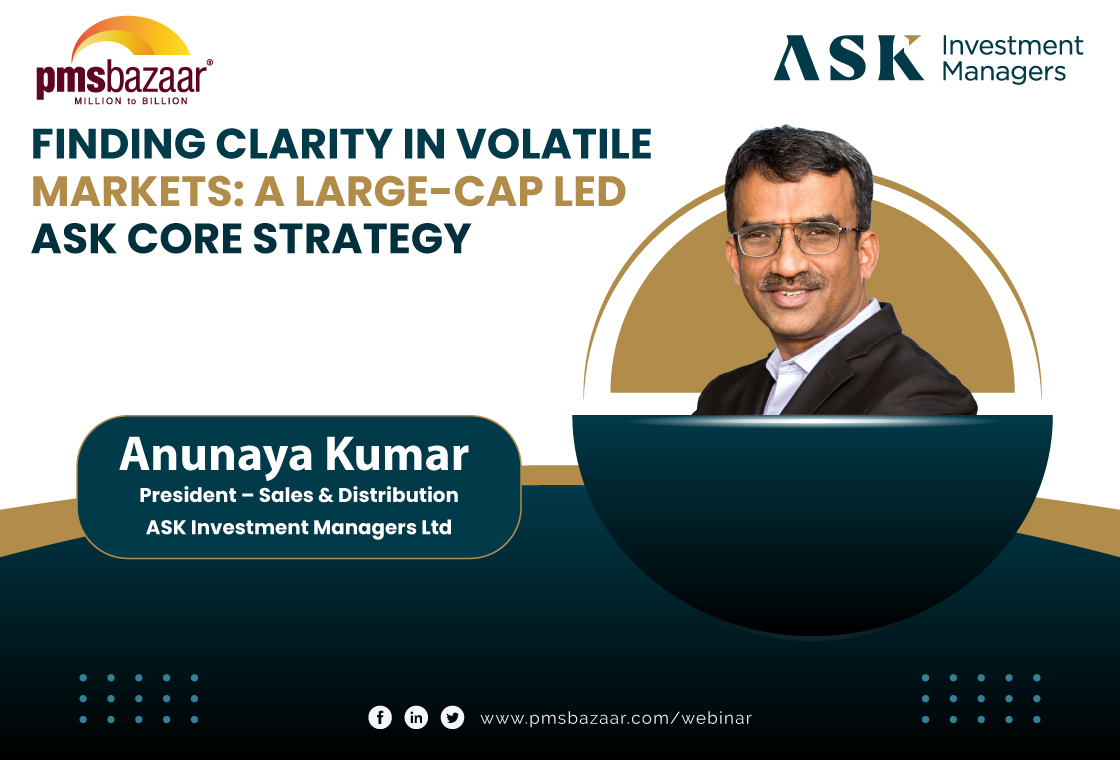Ever since its inception, Marcellus Investment Managers has been trailblazer. In many ways, it has challenged long-held notions. It has proven many wrong. Born with a mission to make wealth creation simple and accessible by being trustworthy and transparent capital allocators, the Marcellus investing team led by Saurabh Mukherjea and Rakshit Ranjan have sort of revolutionised equity investing. They have also remained deeply transparent about their dealings, which has won them many fans in the online and offline world. In a special PMS Bazaar webinar, we look at Marcellus PMS Portfolio CCP, LCP & KCP and also take questions from investors on key topics of discussion.

How they do it
The investing framework at Marcellus has developed from the ideas of Bob Kirby and Peter Thiel. It has 3 main pillars i.e. Clean Accounts, Capital Allocation and Competitive Advantage. Marcellus holds these companies for long periods of time with little or no churn, which allows investors to capture the benefits of long-term compounding and enjoy superior returns.
As explained by Marcellus Founder & CIO, Saurabh Mukherjea, the investment manager tries to identify companies with clean accounting. He talked about 10 forensic accounting checks used to identify naughty firms. Accounting is important because there is strong correlation between accounting quality and shareholder returns. Marcellus has refined a framework built on a book 'Financial Shenanigans: How to Detect Accounting Gimmicks & Fraud in Financial Reports' by Howard Mark Schilit.
Investing in clean companies is no passport for sure-shot wealth creation. The second step is to identify companies with superior capital allocation. The volatility of returns of a portfolio for holding periods of over 3 years is like a Government of India bond.
Explaining the third step i.e. to identify companies with high barriers of entry, Marcellus' Rakshit Ranjan talks about in-depth bottom-up research of firms which pass filters to assess sustainable competitive moats. It is then a portfolio of 10-15 stocks which consistently compound earnings can be made.
As per Marcellus research, in most sectors, the top 1-2 companies account for 80 per cent of profit pie. In paints, there are Asian Paints and Berger Paints. In small cars, there is Maruti and Hyundai. In biscuits, there is Britannia and Parle. In cigarettes, there is ITC. In adhesives, there is Pidlite. In cooking oil, there is Marico and Adani. In hair oil, there is Marico and Bajaj Corp.
Rakshit Ranjan also spent a few minutes through an incisive case study of Asian Paints.
Questions and Answers
The first question was on why Saurabh in the book 'Coffee Can Investing: The Low Risk Road to Stupendous Wealth' talks about buy-and-hold and equal weight positions in stocks but Marcellus in its PMS strategies uses different weight for different stocks. Responding to it, Rakshit Ranjan explained that even though all the companies are great, but the conviction level is different. He also shared an example of active management involving Bajaj Finance stock. "After the March 2020 crash, we hiked position by 3x in Bajaj Finance. The stock has also gained by 3x since then. In an equal-weight and buy-and-hold approach, this could not be done," he explained.
To a question on why Marcellus does not invest in startups, Rakshit Ranjan elaborated that there is no hard evidence to suggest that startups have used disruption to grow business. In fact, in many cases, disruptions have been witnessed and companies have simply waited and seen their businesses being ravaged. "...though some startups become unicorns, many have fallen by the wayside too. While building portfolio, we don't want our portfolio to have 1-2 stocks that do well while the rest perform badly. Hence, we dont do startup investing. In terms of IPOs, we do look at attractive opportunities. For instance, we bought Dr. Lal Pathlabs soon after its listing," he added.
To a question on the 'hot sector' specialty chemicals prospects, Saurabh responded saying that as investment managers the job is simple. "It is to look at companies whose FCF (Free Cash Flow) is compounding at 20-30 per cent. M-cap compounding for Coffee Can Portfolio companies has been broadly in-line with free cash flow compounding over the last 2 decades. He also added that even in Marcellus Little Champs portfolio, earnings are complemented by strong free cash flow, return on capital employed and debt reduction. He talked about two specialty chemical companies that are portfolio constituents - Alkyl Amines and Galaxy Surfactants, and remarked there is long way to go for them.
Saurabh advised investors to stop doing a few things.
1. Stop looking at PE multiples
2. Stop reading broker research
3. Stop investing based on tips
Investing in high PE stocks?
A common question these days is on high P/E (price to earnings multiple). Saurabh told investors that clean promoters who don't steal investors' hard-earned money, companies that make essential products and services, and companies who simply have no competition offer solid routes to generate wealth.
Talking about high P/E conundrum, Rakshit Ranjan shares that price of a stock has two components
Price (P) = PE (which is non-compounding but oscillating) x Earnings (which can compound).
Discounted cash flow (DCF) is a valuation method used to estimate the value of an investment based on its expected future cash flows. Rakshit Ranjan said: "Conventional DCF method undervalues longevity of business."
He added: "Fair value P/E increases with increasing conviction in longevity assumptions."
Giving examples, Marcellus team showed that stocks such as Abbott India, Asian Paints, Nestle etc. seem to trade at 60-70 times PE, but they have always been trading at these levels. If an investor missed out on investing in them, they missed the cash generation that happened over last 10-20 years.
However, they also warned that not all companies are cheap at 50 times PE. In fact, companies at 10 times can be highly expensive as well.
Strategy,books
Saurabh said from August 2022 onwards, the first generation of Little Champ PMS strategy investors may get out. This will open up spots for new investors to come. Rs 1 crore invested in Little Champs is worth about Rs 2.5 crore today. "We can't take money just like that. Or else, we will doing what others do i.e. take investor money just like that. There has to be an opportunity for investors," he said.
On books he is currently reading, Saurabh talked about 'Noise' by Daniel Kahneman, Cass Sunstein, and Olivier Sibony.
Apart from this, investors can read 'Buffett: The Making of an American Capitalist' by Roger Lowenstein, 'The Outsiders : Eight Unconventional CEOs and Their Radically Rational Blueprint for Success' by William Thorndike and 'A Wealth of Common Sense: Why Simplicity Trumps Complexity in Any Investment Plan' by Ben Carlson.
Saurabh and Rakshit next book titled 'Diamonds in the Dust' will be out in August 2021. The book offers Indian savers a simple, yet highly effective, investment technique to identify clean, well-managed Indian companies that have consistently generated outsized returns for investors. Based on in-depth research conducted by the award-winning team at Marcellus Investment Managers, it uses case studies and charts to help readers learn the art and science of investing in the US$3 trillion Indian stock market. The book also debunks many notions of investing that have emerged from the misguided application of Western investment theories in the Indian context.
For more information, please contact info@pmsbazaar.com
Recent Blogs

January Rout, Extreme Dispersion: PMS Returns Swing From Losses to Gains
Benchmark falls deepened losses, but multi-asset and debt cushioned portfolios meaningfully

Investment Frameworks : A Practitioner’s Guide
PMS Bazaar recently organized a webinar titled “Investment Frameworks: A Practitioner’s Guide,” which featured Mr. Sumit Agrawal, Senior Vice President, Nuvama Asset Management Limited. This blog covers the important points shared in this insightful webinar.

Aurum Multiplier Portfolio - Where Small and Mid-Cap Alpha Meets Large-Cap Stability
PMS Bazaar recently organized a webinar titled “Aurum Multiplier Portfolio - Where Small and Mid-Cap Alpha Meets Large-Cap Stability,” which featured Mr. Sandeep Daga, MD& CIO, Nine Rivers Capital and Mr. Kunal Sabnis, Portfolio Manager, Nine Rivers Capital. This blog covers the important points shared in this insightful webinar.

Flat Markets, Wide Outcomes: How 484 PMS Strategies Performed in Dec 2025
December 2025 was a month where market returns stayed close to flat, with the Nifty 50 TRI at -0.28% and the BSE 500 TRI at -0.24%.

Equity Markets 2026: Outlook, Risks and Strategy
PMS Bazaar recently organized a webinar titled “Equity Markets 2026: Outlook, Risks and Strategy,” which featured Mr. Ashish Chaturmohta, MD & Fund Manager – APEX PMS, JM Financial Limited. This blog covers the important points shared in this insightful webinar.

MICRO CAPS: The Dark Horses of the Indian Equity Market
PMS Bazaar recently organized a webinar titled “MICRO CAPS: The Dark Horses of the Indian Equity Market,” which featured Mr. Rishi Agarwal and Mr. Adheesh Kabra, both Co-Founders and Fund Managers, Aarth AIF. This blog covers the important points shared in this insightful webinar.

Finding Clarity in Volatile Markets: A Large-Cap Led ASK CORE Strategy
PMS Bazaar recently organized a webinar titled “Finding Clarity in Volatile Markets: A Large-Cap Led ASK CORE Strategy,” which featured Mr.Anunaya Kumar, President – Sales and Distribution ASK Investment Managers Limited. This blog covers the important points shared in this insightful webinar.
.jpg)
Passively Active Investing — A Modern Investor’s Lens on ETF-Based PMS
PMS Bazaar recently organized a webinar titled “Passively Active Investing — A Modern Investor’s Lens on ETF-Based PMS,” which featured Mr. Karan Bhatia, Co-Founder and Co-Fund Manager , Pricebridge Honeycomb ETF PMs. This blog covers the important points shared in this insightful webinar.

